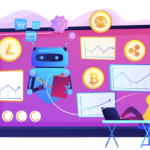The horizon of property transactions is undergoing a revolutionary transformation, paving the way for a more digital decentralized real estate era. This new age of real estate management and investment promises to make properties more accessible, transactions more secure, and processes more transparent.
This blog post delves into the various dimensions of how technology, especially blockchain, is reshaping the real estate landscape, making it more digital and decentralized, and what it means for investors, owners, and the global economy at large.
The Rise of Digital Decentralized Real Estate
The concept of digital decentralized real estate leverages blockchain technology to democratize access to real estate investments and streamline property management processes. This innovative approach is breaking down traditional barriers, making it easier for small investors to enter the market.
Blockchain technology ensures that all transactions are secure, transparent, and immutable. This means that once a transaction is recorded on the blockchain, it cannot be altered, providing a new level of trust in real estate transactions.
Moreover, the use of smart contracts allows for automatic execution of agreements without the need for intermediaries, reducing costs and increasing efficiency in real estate dealings.
By embracing this digital transformation, the real estate sector is becoming more inclusive, efficient, and secure, presenting opportunities for innovation and growth.
Benefits of a Decentralized Approach
Decentralizing real estate transactions offers several advantages over traditional methods. Firstly, it significantly reduces the need for intermediaries such as brokers and lawyers, which can make the buying and selling process more affordable.
Secondly, it offers enhanced security features, protecting against fraud and ensuring that all parties can trust the transaction process. Transparency is another critical benefit, as all transactions are recorded on a public ledger, accessible by all parties involved.
Lastly, this approach can make real estate markets more liquid, allowing for the tokenization of property assets and their sale in smaller fractions, thereby opening the market to a broader base of investors.
Challenges and Considerations
While digital decentralized real estate offers numerous benefits, it is not without its challenges. Regulatory uncertainty is one of the biggest hurdles, as governments around the world are still grappling with how to incorporate blockchain technology within existing legal frameworks.
Moreover, there are technical barriers to wider adoption, including the need for more robust infrastructure to support these digital transactions and ensuring that all parties have the necessary digital literacy.
Another consideration is the environmental impact of blockchain technology, particularly the energy consumption required for transaction validation processes. This necessitates ongoing innovation to find more sustainable solutions.
Case Studies: Success Stories
Several pioneering projects have successfully implemented digital decentralized methods in their real estate operations. For example, companies have created platforms that allow individuals to buy and sell fractions of property, making investment accessible to many who were previously excluded due to high entry barriers.
Another success story involves the use of blockchain for land registry purposes in some countries, significantly reducing fraud and making property ownership more transparent.
These case studies prove that with the right approach and technology, a decentralized real estate market can thrive, offering benefits for investors, owners, and the broader community.
Future Outlook: Where Are We Heading?
The potential of digital decentralized real estate is immense. As technology advances and regulatory frameworks evolve, we can expect this sector to grow significantly.
In the future, we might see global real estate markets becoming more interconnected, with blockchain enabling seamless cross-border transactions. The further development of virtual real estate in emerging metaverses also presents intriguing investment opportunities.
Moreover, as sustainability becomes a growing concern, the sector will likely innovate to reduce its environmental footprint, aligning digital real estate practices with global sustainability goals.
Preparing for a Digital Real Estate Future
For those looking to engage with digital decentralized real estate, staying informed about technological and regulatory developments is crucial. Building knowledge in blockchain technology and digital transactions will be invaluable.
Additionally, considering the environmental aspect of digital transactions and advocating for sustainable practices will be essential for responsible investment in this burgeoning sector.
In conclusion, the future of real estate lies in its digital decentralization, presenting exciting opportunities for innovation and investment. By understanding and embracing this shift, stakeholders across the spectrum can unlock the full potential of this transformative trend. As we look forward, the digital decentralized real estate sector promises to make property ownership and investment more accessible, secure, and environmentally conscious than ever before.


